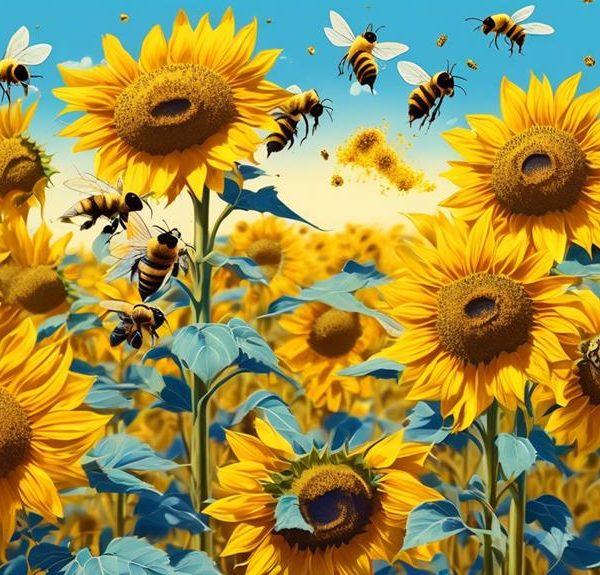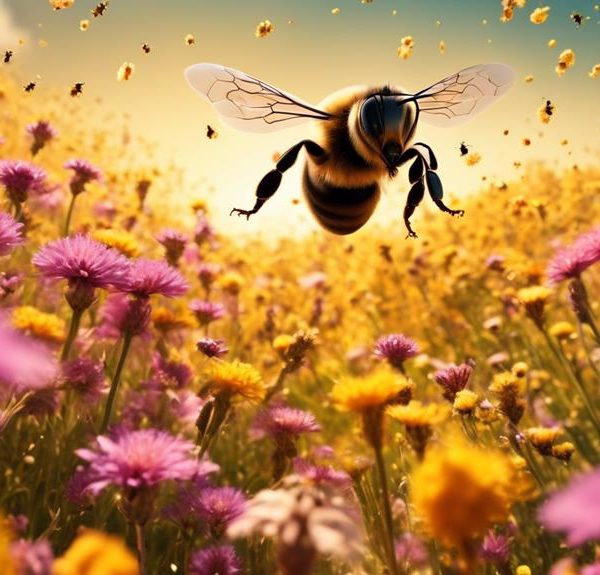Journey with us as we explore natural, healthy alternatives to sugar for feeding bees, igniting curiosity for the bee enthusiasts.
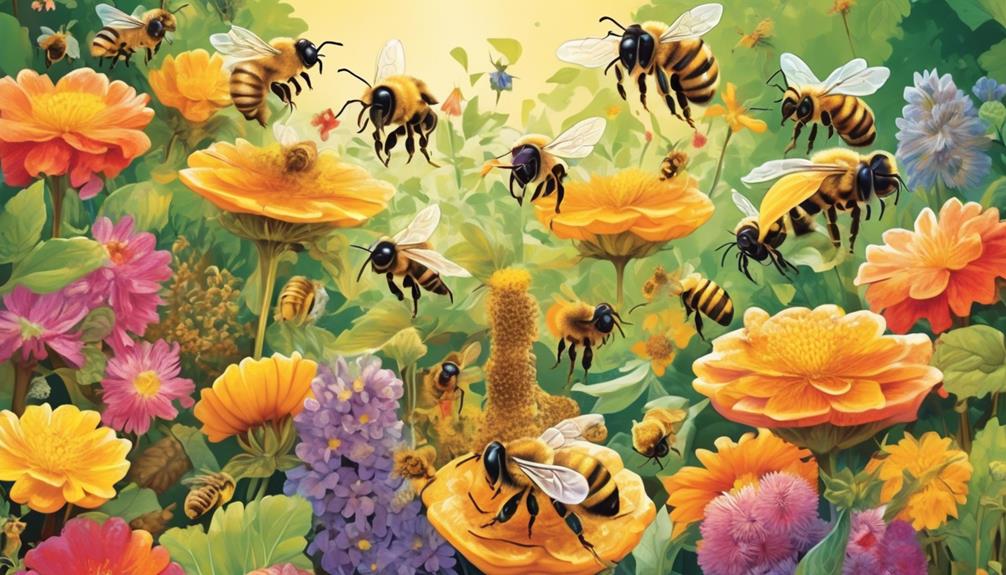
What Can You Give Bees Instead of Sugar?
Just like a well-tuned engine needs the right fuel to perform optimally, bees also require suitable nutrition to thrive.
You're probably familiar with feeding bees sugar water, a common practice among beekeepers. But, have you ever wondered if there's a healthier, more natural alternative for these industrious insects? It's a question that's been buzzing in the minds of many, especially those concerned about bee health.
You might be surprised to discover the range of options that exist. Let's embark on this sweet journey to reveal what else you can offer our winged friends.
Key Takeaways
- Bees require a balanced diet of carbohydrates, proteins, lipids, vitamins, and minerals.
- Sugar water should be used sparingly as it lacks essential nutrients and can cause health issues for bees.
- Natural alternatives such as floral nectar, honey, bee bread, and starch-based feed are better options for bee nutrition.
- Consider the nutritional requirements, timing, and quality of feed supplements when providing alternatives to sugar for bees.
Understanding Bee Nutrition
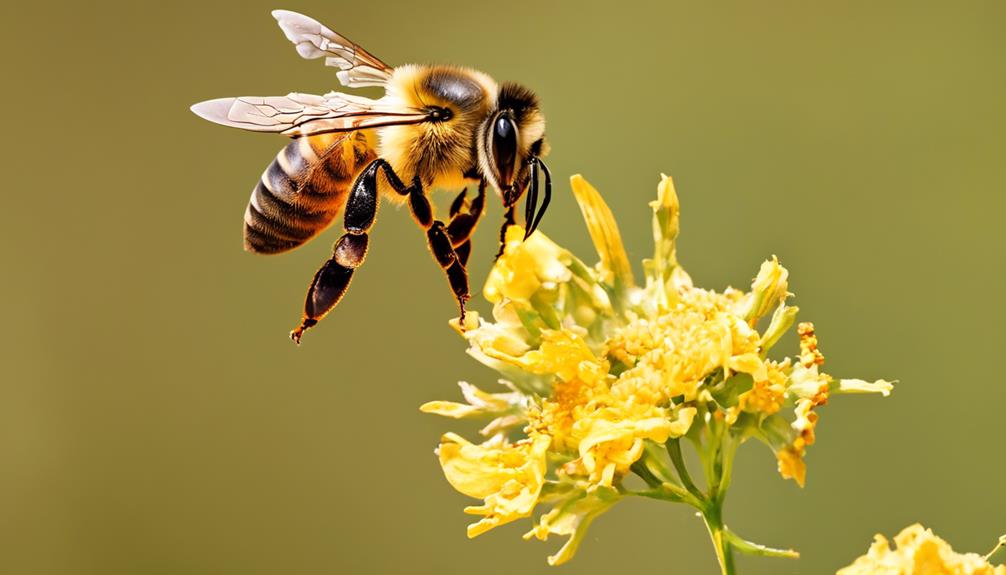
To grasp the importance of sugar substitutes for bees, you must first delve into the intricacies of bee nutrition.
Bees, like other insects, have a balanced diet comprising carbohydrates, proteins, lipids, vitamins, and minerals. Nectar, their primary source of carbohydrates, fuels their energy-intensive flight and daily activities. However, during scarce nectar periods, they often resort to sugar solutions provided by beekeepers.
Yet, not all sugars are created equal in the bee world. Bees can't metabolize certain sugars like lactose and maltose, and excessive intake of others like fructose can be harmful. Therefore, beekeepers typically use sucrose solutions, which closely mimic nectar's composition. But, potential drawbacks such as disease transmission and nutritional imbalance necessitate finding healthier substitutes.
Pollen, a rich protein source, is vital for larvae growth and adult bees' immune function. Unfortunately, many substitute feeds lack this essential component, leading to reduced bee vitality. So, any alternative mustn't only provide the requisite energy but also meet the bees' complex nutritional needs.
Understanding these facets of bee nutrition empowers you to make informed decisions when choosing bee-friendly sugar substitutes.
The Problem With Sugar Water

While sugar water might seem like an easy solution for feeding bees during nectar shortages, it's not without its problems. Scientifically, sugar water lacks essential nutrients that bees need to thrive. It's akin to you surviving solely on candy bars – you'd be getting calories, but missing out on vitamins, proteins, and other crucial elements of a balanced diet.
Furthermore, sugar water can cause digestive issues for bees. It's harder for them to digest than natural nectar, potentially leading to dysentery. This digestive upset can weaken the hive's overall health and make them more susceptible to disease and pests.
Also, if you're not careful, sugar water can promote the growth of harmful mold and bacteria in the feeder or the hive. This risk increases if the sugar water isn't changed regularly or if the feeder isn't cleaned properly.
Lastly, consistently feeding bees sugar water can make them reliant on it and deter them from foraging for natural nectar. This not only threatens their nutrition but also impacts the pollination process, which is essential for our ecosystem.
Natural Nectar Alternatives
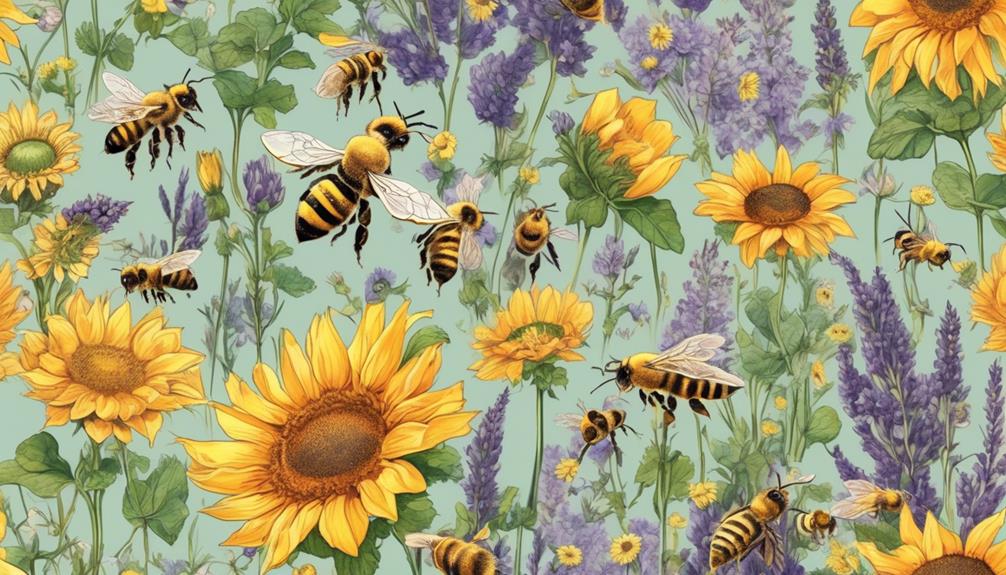
Given the drawbacks of sugar water, you might be wondering what natural alternatives can be used to feed bees that provide the essential nutrients they need. One such alternative is floral nectar. Bees naturally consume nectar from flowers, which is rich in sugars, amino acids, vitamins, and minerals. It's the bee's primary food source and drives their foraging behavior.
Another option is honey, particularly from their own hive. Honey is essentially nectar that's been processed by bees, and it's packed with nutrients. However, you must ensure it's free from disease spores to prevent contamination.
You can also offer bee bread, a bee-made product from pollen and honey. It's a protein-rich food source that bees use to feed their larvae.
Fruit juices are another possibility. These can offer a quick and easy sugar source, but they lack the nutrients of nectar, honey, or bee bread.
Starch-Based Bee Feed
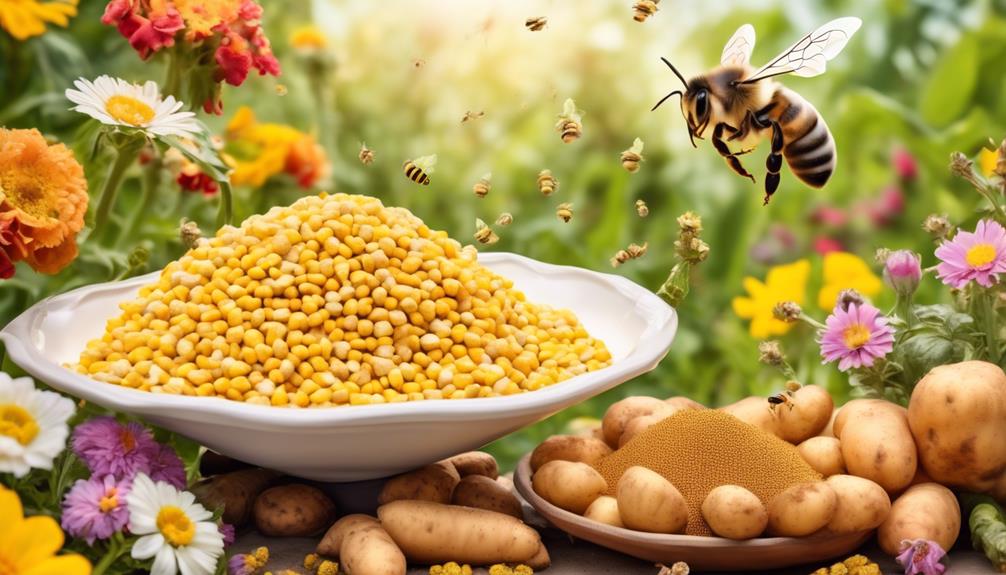
Diving deeper into the realm of bee nutrition, let's explore starch-based feeds, an alternative that provides bees with essential carbohydrates in a form that mimics the complex sugars found in their natural diet. Starch-based feed is a rich source of polysaccharides, which bees can break down into simpler sugars to fuel their metabolic processes.
You might be wondering, why not just feed bees simple sugars? Well, the answer lies in the bees' digestive system. It's built to process complex carbohydrates, like those found in nectar, pollen, and tree saps. Simple sugars, on the other hand, can disturb the bees' gut microbiota, leading to health problems down the line.
Considerations for Bee Feeding
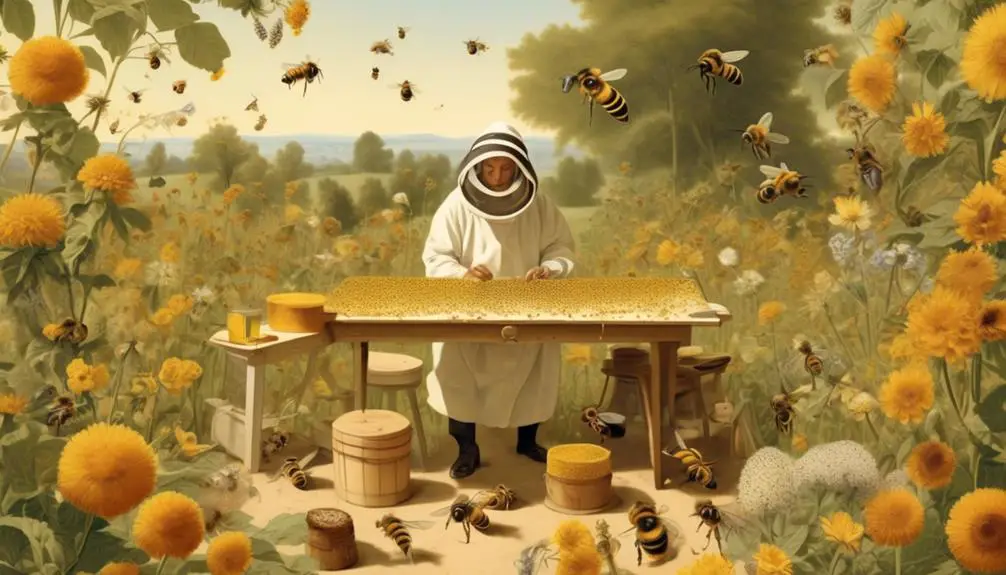
Having understood the benefits of starch-based feed, it's also important that you're aware of certain factors when deciding what to feed your bees.
Firstly, consider the nutritional requirements of your bees. Just like other animals, bees require a balanced diet. Starch-based feed, though beneficial, shouldn't replace natural nectar entirely. Bees still need pollen for protein and other nutrients.
Secondly, timing is crucial. Feed supplements should be given during times of scarcity, such as winter or drought. Overfeeding can disrupt their natural foraging behavior and make them overly dependent on the feed.
Thirdly, the quality of the feed matters. Inferior feeds can cause dysentery and other health problems in bees. Make sure the starch-based feed is free from chemicals and additives that might harm the bees.
Lastly, consider the cost and availability. While starch-based feed might be more beneficial than sugar syrup, it might also be more expensive or harder to source. You'll need to weigh the benefits against the costs to decide what's best for your hive.
Frequently Asked Questions
What Are the Potential Health Risks to Bees if They Are Fed Sugar Substitutes?
Feeding bees sugar substitutes can put their health at risk. Artificial sweeteners lack the essential nutrients found in natural nectar, weakening the bees' immune systems. They're also less digestible, causing digestive issues.
Moreover, some sugar substitutes contain harmful chemicals, potentially leading to bee fatalities. It's best you stick to natural sources like honey or sugar, ensuring your bees are getting the nutrients they need.
How Can I Tell if My Bees Are Not Getting the Proper Nutrition?
You can tell if your bees aren't getting proper nutrition by observing their behavior and physical condition. If they're sluggish or their population isn't growing, they might be malnourished. Check for shrunken, deformed or discolored bodies.
Inspect the brood pattern; a spotty or irregular pattern can indicate nutritional issues. Also, monitor the honey and pollen stores. If they're low, your bees may not be getting enough to eat.
Are There Any Specific Times of the Year When Bees Need More Feeding?
Yes, there are specific times when bees need more feeding. During late summer and fall, bees often require supplemental feeding as natural nectar sources become scarcer.
Also, in early spring when flowers aren't yet blooming, bees might need extra help. You'll want to monitor your hive's food stores closely during these periods and supplement as needed.
Can Honey Be Used as a Substitute for Sugar in Bee Feeding?
Yes, honey can be used as a substitute for sugar in bee feeding.
But be aware, it's best to use honey from the same hive.
Using honey from a different hive or store-bought honey could introduce diseases or parasites.
So, you're better off sticking with sugar syrup – it's safer and more easily digestible for your bees.
What Are Some Common Mistakes Beekeepers Make When Feeding Their Bees?
Common mistakes you might make when feeding your bees include:
- Offering too much or too little food
- Not adjusting for seasonal changes
- Using poor quality substitutes like artificial sweeteners
You shouldn't forget to:
- Clean feeders, as they can harbor disease
- Avoid feeding honey from unknown sources, as it can introduce harmful pathogens
It's crucial to monitor your bees' health and adjust your feeding strategy accordingly.
Conclusion
In conclusion, while sugar water is common, it's not the best for bees' health.
Natural nectar alternatives, like wildflower nectar, offer superior nutrition.
Starch-based feeds could also be an option, but their impact on bee health needs further research.
Always consider the bees' nutritional needs and natural diet when deciding what to feed them.
After all, our bees' health is paramount, and we must do all we can to support it.

